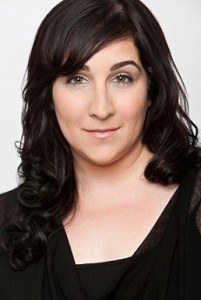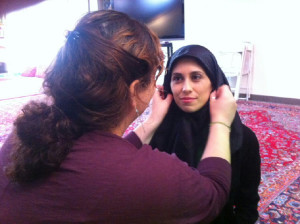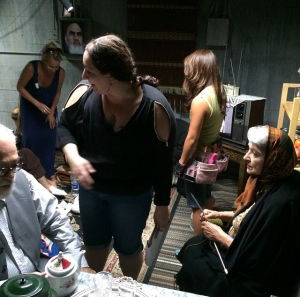Arpa Film Festival 2015 interviews with film directors

Parisa Barani, director
Ablution explores the inner life of a conservative Muslim woman named Neda and her struggle to reconcile her sexuality and spirituality in 1980s Tehran. Shunned by Iranian society as an “old maid” at a mere 25 years of age, she finds comfort and refuge in her faith. When an unexpected visitor moves into her apartment, Neda makes a fatal decision that forces her to come of age in a remarkable yet unspeakable way.
Barani’s film screens at the 18th Annual Arpa International Film Festival on November 15. Sharon Swainson, Arpa Film Festival writer, interviewed Parisa Barani by telephone. Her answers are below.
Why did you choose to make your film?
I always wanted to make films since I was a little. As far as this film I’ve seen films addressing female empowerment and this type of feminine point of view in the middle east. I am interested in exploring the relationship between sensuality and spirituality and why the relationship cannot coexist. I wanted to open up a question regarding why they don’t coexist without repression. The only way was to get married and have children. Hence, the ending of my film is the beginning of my characters life.
Name a moment during shooting that made you proud.
The first day of shooting when I saw everything come together. After two and one-half years of writing this script, being on the set as a first time filmmaker was surreal. When it all came together I was thinking ‘this is real, this is happening.’
 Was there a moment that became a creative breakthrough while making your film?
Was there a moment that became a creative breakthrough while making your film?
Yes, throughout the writing process. I had a lot to balance and thought about how people would perceive my film and whether they would be offended. But at the end of the day, it is when you’re most afraid when you know you are doing the right thing. I was fearful, so I knew I was on the right path.
Another moment was when shooting the last scene. I tried not to be calculated and I didn’t know what direction in which I wanted to go. I told the actor to go with whatever you feel. Letting go of my thoughts and allowing the actors go with it was wonderful.
During the creative process, was there a moment when you let go of certainties and just ran with it, allowing creativity to do its thing?
Originally we had a scene at the ocean and one in the desert. Shooting challenges happened and we couldn’t shoot at the ocean location. I was very disappointed. A sandstorm came in for the desert shoot, and then water rushed in at the ocean. So I let go of everything and just went ahead and decided to shoot anyway. It turn out to be exceptionally rewarding. It worked out great. It was better than we had actually planned.
Since an artist is truly never finished, is there anything that you would like to do differently or add to your film?
Yes!! I would want to have shot it in Farsi, my native language. It would have been easier for me (Barani chuckled).
What does it mean to you to have your film selected by the Arpa International Film Festival?
It means a lot because I know that the Arpa International Film Festival is all about social change. Also, I have two Armenian actors in the film, and the Festival is in Los Angeles. Furthermore, it’s great to have the film shown to non middle-eastern and middle-eastern people so they can explore and experience that we all have challenges, and that many of those challenges are similar.
 Written by Sharon Swainson
Written by Sharon Swainson
Communications & Content Development
2015 Arpa International Film Festival
